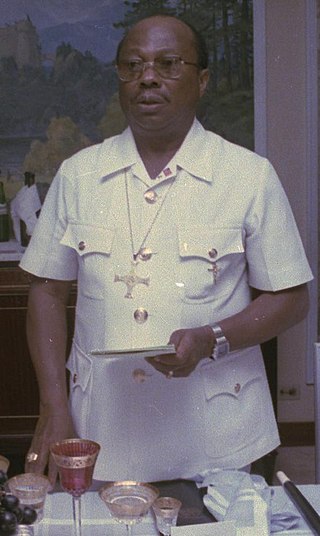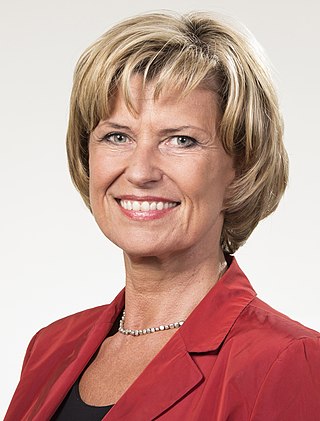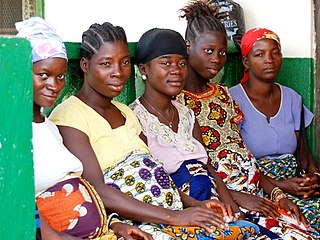Related Research Articles

Liberia, officially the Republic of Liberia, is a country on the West African coast. It is bordered by Sierra Leone to its northwest, Guinea to its north, Ivory Coast to its east, and the Atlantic Ocean to its south and southwest. It has a population of around 5.5 million and covers an area of 43,000 square miles (111,369 km2). The official language is English. Over 20 indigenous languages are spoken, reflecting the country's ethnic and cultural diversity. The capital and largest city is Monrovia.

William Richard Tolbert Jr. was a Liberian politician who served as the 20th president of Liberia from 1971 until his assassination in 1980.
Ferdinand Léopold Oyono was a diplomat, politician and author from Cameroon.

Dagmar Gabriele Wöhrl is a German politician of the Christian Social Union in Bavaria (CSU). She has served as Chairwoman of the Committee for Economic Cooperation and Development of the German Bundestag. She was also a member of the 'Parliamentary Friendship Group for Relations with Arabic-Speaking States' in the Middle East.
The Lofa Defense Force (LDF) was a rebel group that participated in the Liberian Civil War.
Omar Abdi is a Somali-Canadian diplomat. He serves as the Deputy Executive Director of the United Nations Children's Fund (UNICEF).
UNICEF, originally the United Nations International Children's Emergency Fund, officially United Nations Children's Fund since 1953, is an agency of the United Nations responsible for providing humanitarian and developmental aid to children worldwide. The organization is one of the most widely known and visible social welfare entities globally, operating in 192 countries and territories. UNICEF's activities include providing immunizations and disease prevention, administering treatment for children and mothers with HIV, enhancing childhood and maternal nutrition, improving sanitation, promoting education, and providing emergency relief in response to disasters.

Guinea faces a number of ongoing health challenges.

Liberia is one of the poorest countries in the world. Civil wars have killed around 250,000 people and displaced many more. The wars ended in 2003 but destroyed most of the country's healthcare facilities. Recovery precedes proceeds, but the majority of the population still lives below the international poverty line. Life expectancy in Liberia is much lower than the world average. Communicable diseases are widespread, including tuberculosis, diarrhea, malaria, HIV, and Dengue. Female genital mutilation is widely practiced. Nearly a quarter of children under the age of five are malnourished and few people have access to adequate sanitation facilities. In 2009, government expenditure on health care per-capita was US$22, accounting for 10.6% of totaled GDP. In 2008, Liberia had only one doctor and 27 nurses per 100,000 people. It was ill-equipped to handle the outbreak of Ebola in 2014 and 2015.

The extent of gender inequalities varies throughout Liberia in regard to status, region, rural/urban areas, and traditional cultures. In general, women in Liberia have less access to education, health care, property, and justice when compared to men. Liberia suffered two devastating civil wars from 1989–1996 and 1999–2003. The wars left Liberia nearly destroyed with minimal infrastructure and thousands dead. Liberia has a Human Development Report ranking of 174 out of 187 and a Gender Inequality Index rank of 154 out of 159.

The 2013–2016 epidemic of Ebola virus disease, centered in West Africa, was the most widespread outbreak of the disease in history. It caused major loss of life and socioeconomic disruption in the region, mainly in Guinea, Liberia and Sierra Leone. The first cases were recorded in Guinea in December 2013; the disease spread to neighbouring Liberia and Sierra Leone, with minor outbreaks occurring in Nigeria and Mali. Secondary infections of medical workers occurred in the United States and Spain. Isolated cases were recorded in Senegal, the United Kingdom and Italy. The number of cases peaked in October 2014 and then began to decline gradually, following the commitment of substantial international resources.

Cyvette M. Gibson is the tenth Mayor of Paynesville, Liberia. She was appointed as acting Mayor on November 14, 2012; the youngest mayor in the country. Her administration faced an Ebola epidemic, persistent waste management issues, and human rights concerns.

An epidemic of Ebola virus disease occurred in Liberia from 2014 to 2015, along with the neighbouring countries of Guinea and Sierra Leone. The first cases of virus were reported by late March 2014. The Ebola virus, a biosafety level four pathogen, is an RNA virus discovered in 1976.

Organizations from around the world responded to the West African Ebola virus epidemic. In July 2014, the World Health Organization (WHO) convened an emergency meeting with health ministers from eleven countries and announced collaboration on a strategy to co-ordinate technical support to combat the epidemic. In August, they declared the outbreak an international public health emergency and published a roadmap to guide and coordinate the international response to the outbreak, aiming to stop ongoing Ebola transmission worldwide within 6–9 months. In September, the United Nations Security Council declared the Ebola virus outbreak in the West Africa subregion a "threat to international peace and security" and unanimously adopted a resolution urging UN member states to provide more resources to fight the outbreak; the WHO stated that the cost for combating the epidemic will be a minimum of $1 billion.

The Liberian government is conducting a birth registration campaign to record more than 70,000 children whose births were not listed during the Ebola crisis of 2014 and 2015. Previously Liberia had the second lowest rate of birth registration at 4 percent. But a Universal Birth Registration Plan was introduced, and by 2013, birth registration drives had increased the rates in Liberia to 25 percent.
Joseph W. Willard was a Canadian politician, economist and civil servant in the public health field. He served as Chairman of UNICEF from 1966 to 1968, and as Deputy Minister of Welfare in the Department of National Health and Welfare from 1960.

Suraya Dalil, is an Afghan physician and politician who served as Minister of Public Health from 2010 to 2014 and has been the country's Permanent Representative to the United Nations since November 2015.

Axel Marcel Addy served as Minister of Commerce and Industry under Ellen Johnson Sirleaf from April 2013 to January 2018. While in office, he focused on investment diversification, agriculture, small and medium businesses, and integration into the world economy. He was Chief Negotiator during Liberia's successful accession to the World Trade Organization.

Sara Frances Beysolow Nyanti is an international development expert, Liberian pastor and since February 2024 the Foreign Minister of Liberia. She has more than 20 years of professional experience. She was the United Nations Assistant Secretary General from December 2021 to her retirement in July 2023.
Daniel Flomo Naatehn Sr. was a Liberian politician.
References
- ↑ James Harding Giahyue (October 12, 2014). "Liberia health workers' strike on Monday could hurt Ebola efforts". Reuters.
- ↑ J. Burgess Carter (June 3, 2014). "Acting Health Minister Matthew Flomo Faces Senate Today". Liberian Observer.
- ↑ "Liberia's immunization programme gets a 15-generator boost from UNICEF and GAVI". UNICEF. 6 June 2014.